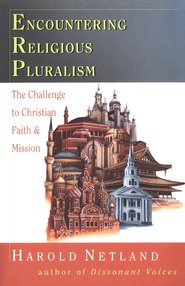Harold Netland: Encountering Religious Pluralism
 Harold Netland, Encountering Religious Pluralism: The Challenge to Christian Faith & Mission (Downer’s Grove, IL: InterVarsity, 2001), 368 pages.
Harold Netland, Encountering Religious Pluralism: The Challenge to Christian Faith & Mission (Downer’s Grove, IL: InterVarsity, 2001), 368 pages.
Netland capably considers all the angles for a thorough study achieving an informed, sophisticated, and faithfully Evangelical theology of religions. This is a must read for anyone seriously studying theology of religions within the bounds of Evangelicalism or beyond. In the context of refuting radical religious pluralism Netland also presents a viable alternative retaining uncompromising Christian commitment but honestly respecting other religious traditions. He is personally well-prepared for this dual emphasis by a lifetime of Christian ministry in Japan. That he has lived what he writes shows in his work. The Trinity Evangelical Divinity School professor is particularly adept at setting the cultural stage for a deeper understanding of contemporary ideological currents involved in the rising popularity of religious pluralism.
Part One puts contemporary religious pluralism into context. Netland explores changing attitudes toward other religions by Christians, “the culture of modernity” and postmodernism as they pertain to pluralism, the nature of encountering and interacting with religious others, and the religious and spiritual aspects of contemporary culture. Notably, Netland analyses the theological journey of possibly the foremost pluralist theologian of our times, John Hick, as an example of cultural and theological dialectics going into the development of modern pluralism. Part Two constructively addresses issues involved in developing a satisfactory theology of religions compatible with Evangelical Christianity. Now Netland hits head-on questions of conflicting truth claims by different religions, problems in Hick’s pluralist paradigm, and challenges for Christian apologetics in answering issues raised by religious pluralism. He suggests criteria for evaluating alternate worldviews proposed by the fact of religious diversity today. Importantly, Netland’s work is not only critical but also constructive; he finishes with a foundation for building an Evangelical theology of religions.
Netland is an associate professor of philosophy of religion, and this shows in his methodology. His arguments are often tight, well-knit constructs requiring close attention to understand. Usually the reward is worth the work. His illustrations, examples, and analogies help. Nevertheless, this is not merely a philosophical treatise. Netland treats divine revelation as paramount. His abundant, reverent use of Scripture can be followed easily enough by anyone with a basic biblical background. Regarding content, Netland really does try to touch all the bases. One noteworthy exception is pneumatology. Typical of some Evangelicals but increasingly hard to understand in light of the modern Pentecostal/charismatic movements, Netland spends major time and space on Christology, necessary in itself of course, but does not even mention notable nuances an informed experience of the Holy Spirit brings to the theology of religions table. Even when discussing Clark Pinnock, who develops a dynamic pneumatological model of theology of religions (cf. Flame of Love: A Theology of the Holy Spirit, Downer’s Grove, ILL: InterVarsity, 1996), he misses (dismisses?) the chance to talk about the role of the Spirit and the religions. Given his usual thoroughness Netland’s negligence on pneumatology is disparate and disappointing.
That being said, two things really make this book a standout work. First, Netland’s discussion of John Hick’s pluralism is very helpful indeed. Hick is probably the leading pluralist of our day and coming to grips with his work is required in theology of religions research. That Netland studied under Hick and speaks of him with high regard yet respectfully disagrees with his pluralist paradigm lends his work added depth and dimension. His discussion on Hick really does help clarify several salient concepts of Hick’s philosophy and theology. In the process, Netland persuasively shows where and why religious pluralism went wrong. Second, Netland’s concluding proposal for an Evangelical theology of religions is exceptionally clear, concise, and constructive. His definition and clarification of the theology of religions task, goals, and tools give guidance on a road seriously needing such signposts for safe navigation. His continuing uncompromising commitment to the uniqueness of Christ and to Christian evangelism and missions in the context of theology of religions is commendable.
Category: Ministry, Winter 2006


